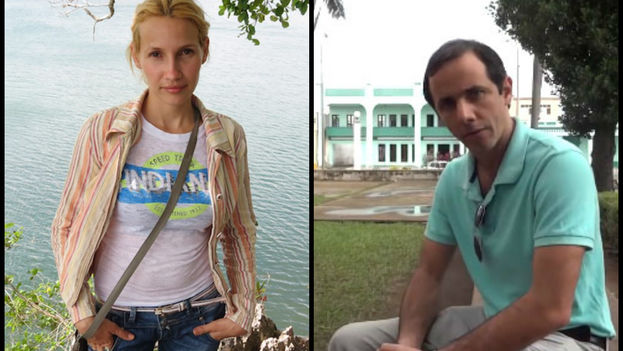
![]() 14ymedio, Havana, 4 May 2017 — Journalists Sol García Basulto and Henry Constantín were summoned Thursday to Camagüey’s Third Police Unit, where they were threatened with having their homes searched and the equipment they use to do their work confiscated if they do not stop “publishing on social networks and in independent magazines.”
14ymedio, Havana, 4 May 2017 — Journalists Sol García Basulto and Henry Constantín were summoned Thursday to Camagüey’s Third Police Unit, where they were threatened with having their homes searched and the equipment they use to do their work confiscated if they do not stop “publishing on social networks and in independent magazines.”
An official, who identified himself as Lieutenant Francisco Pacheco, reproached the young people for continuing to work as journalists and issued each of them a warning.
The official also accused Constantin of buying “200 bags of cement and a bathing suit” which he transported “in a yellow Lada car from Najasa to the city of Camagüey.” However, Constantin categorically denies the accusation and insists that he has not left the city because he is under a “restriction of movement” measure.
On March 23, both reporters were charged with the alleged crime of “usurpation of legal capacity,” a charge that is still active, according to Constantin speaking to 14ymedio a few minutes before the meeting with the police on Thursday.
If the charge goes to trial, they could be tried under Article 149 of the Criminal Code, which punishes those who “perform acts of a profession for which they are not properly qualified.” They would then be subject to a prison sentence of between three months and one year.
The reporters are part of the editorial team of the independent magazine La Hora de Cuba (Cuba’s Hour), which is distributed in digital format. In addition they collaborate with different independent media and García Basulto is a correspondent for 14ymedio in the province of Camagüey.
At the end of last year, Constantín was named regional vice president for Cuba for the Inter American Press Association (IAPA). Recently the reporter was not able to attend a conference in Los Angeles about the current situation of journalists on the Island, nor was he able to attend a later meeting of the IAPA in Guatemala, due to the restrictions of movement imposed on him by police authorities.
García Basulto was warned by the police again this Thursday, about her job of interviewing people and collecting information in public places. A task that she undertakes, according to the officers, to “misrepresent information and write against the government.” The police showed particular annoyance at an interview with the rapper Rapshela published in 14ymedio in March.
In November 2016, State Security prevented the 14ymedio correspondent from leaving her home in the days following the death of former President Fidel Castro, while the funeral procession transported his ashes to Santiago de Cuba.
At that time the young woman denounced the escalating repression against her, which began in December 2015 when she solicited opinions outside the Provincial Court of Camagüey where the trial was being held for the murder of musician Pedro Armando Junco, known as Mandy.
The IAPA believes that the accusations against the two journalists are contrary to international provisions that support “the right to seek, receive, disseminate information and express opinions.”
